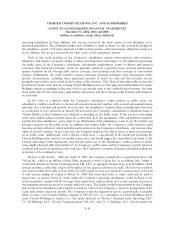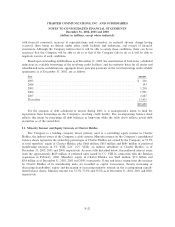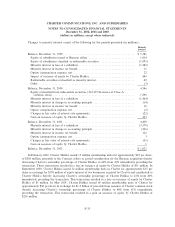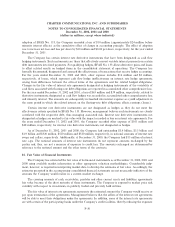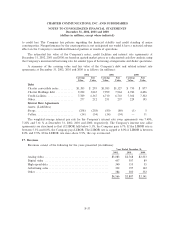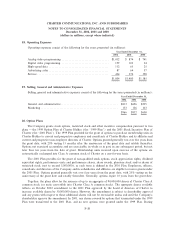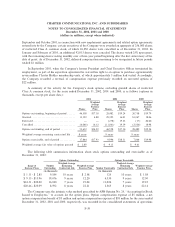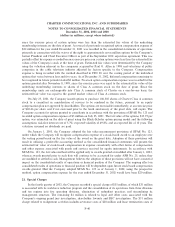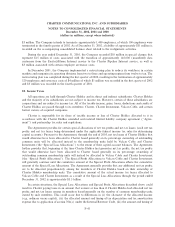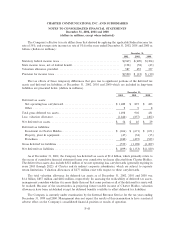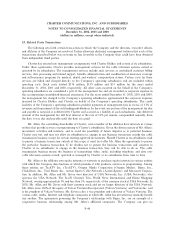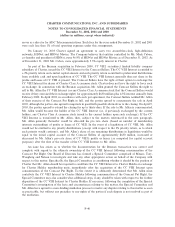Charter 2002 Annual Report Download - page 108
Download and view the complete annual report
Please find page 108 of the 2002 Charter annual report below. You can navigate through the pages in the report by either clicking on the pages listed below, or by using the keyword search tool below to find specific information within the annual report.CHARTER COMMUNICATIONS, INC. AND SUBSIDIARIES
NOTES TO CONSOLIDATED FINANCIAL STATEMENTS
December 31, 2002, 2001 and 2000
(dollars in millions, except where indicated)
since the exercise prices of certain options were less than the estimated fair values of the underlying
membership interests on the date of grant. A reversal of previously recognized option compensation expense of
$22 million for the year ended December 31, 2001 was recorded in the consolidated statements of operations
primarily in connection with the waiver of the right to approximately seven million options by the Company's
former President and Chief Executive OÇcer as part of his September 2001 separation agreement. This was
partially oÅset by expense recorded because exercise prices on certain options were less than the estimated fair
values of the Company's stock at the time of grant. Estimated fair values were determined by the Company
using the valuation inherent in the companies acquired by Paul G. Allen in 1998 and valuations of public
companies in the cable television industry adjusted for factors speciÑc to the Company. Compensation
expense is being recorded with the method described in FIN 28 over the vesting period of the individual
options that varies between four and Ñve years. As of December 31, 2002, deferred compensation remaining to
be recognized in future periods totaled $2 million. No stock option compensation expense was recorded for the
options granted after November 8, 1999, since the exercise price was equal to the estimated fair value of the
underlying membership interests or shares of Class A common stock on the date of grant. Since the
membership units are exchangeable into Class A common stock of Charter on a one-for-one basis, the
estimated fair value was equal to the quoted market values of Class A common stock.
On July 25, 2001, the Company issued options to purchase 186,385 shares of Charter Class A common
stock to a consultant in consideration of services to be rendered in the future, pursuant to an equity
compensation plan not approved by shareholders. The options are exercisable immediately, at an exercise price
of $20.46 per share and if not exercised prior to the tenth anniversary of the grant date, will expire. The
Company accounts for options granted to consultants in accordance with the provisions of SFAS No. 123 and
recorded option compensation expense of $3 million on July 25, 2001. The fair value of the options, $13.95 per
option, was estimated on the date of grant using the Black-Scholes option-pricing model and the following
assumptions: risk-free interest rate of 5.7%; expected volatility of 49.8%; and an expected life of 10 years. The
valuation assumed no dividends are paid.
On January 1, 2003, the Company adopted the fair value measurement provisions of SFAS No. 123,
under which the Company will recognize compensation expense of a stock-based award to an employee over
the vesting period based on the fair value of the award on the grant date. Adoption of these provisions will
result in utilizing a preferable accounting method as the consolidated Ñnancial statements will present the
estimated fair value of stock-based compensation in expense consistently with other forms of compensation
and other expense associated with goods and services received for equity instruments. In accordance with
SFAS No. 123, the fair value method will be applied only to awards granted or modiÑed after January 1, 2003,
whereas awards granted prior to such date will continue to be accounted for under APB No. 25, unless they
are modiÑed or settled in cash. Management believes the adoption of these provisions will not have a material
impact on the consolidated results of operations or Ñnancial position of the Company. The ongoing eÅect on
consolidated results of operations or Ñnancial position will be dependent upon future stock based compensation
awards granted. Had the Company adopted SFAS No. 123 as of January 1, 2002, using the prospective
method, option compensation expense for the year ended December 31, 2002 would have been $20 million.
21. Special Charges
In the fourth quarter of 2002, the Company recorded a special charge of $35 million, of which $31 million
is associated with its workforce reduction program and the consolidation of its operations from three divisions
and ten regions into Ñve operating divisions, elimination of redundant practices and streamlining its
management structure. The remaining $4 million is related to legal and other costs associated with the
Company's ongoing grand jury investigation, shareholder lawsuits and SEC investigation. The $31 million
charge related to realignment activities includes severance costs of $28 million and lease termination costs of
F-40


